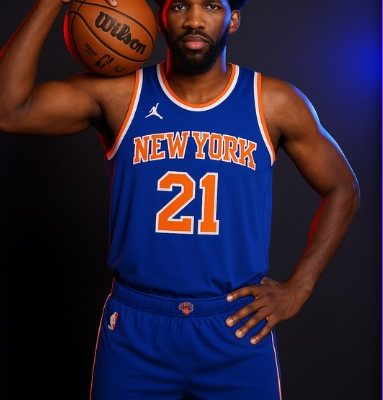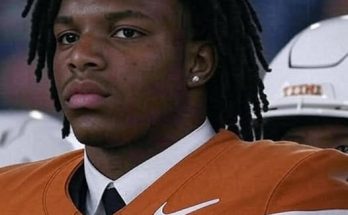The potential move of Joel Embiid to the New York Knicks is not just an intriguing hypothetical or a headline-generating what-if. It is a basketball transaction that, if executed properly, could redefine the trajectories of two historic franchises. For Embiid, the reigning 2023 MVP and one of the most dominant big men of the modern era, a change of scenery to the mecca of basketball might be exactly what he needs to chase immortality. And for the New York Knicks, who have long craved a superstar who can lift them from perennial playoff hopefuls to true championship contenders, this is the kind of move that could finally bring them back to the NBA’s elite.
Joel Embiid’s career has been one of resilience, brilliance, and what-ifs. From missing his first two NBA seasons due to injury, to becoming an unstoppable force on both ends of the court, Embiid has seen the full spectrum of professional highs and lows. In Philadelphia, he has been the heart and soul of a franchise that promised “The Process” would bring titles. And while the Sixers have remained relevant—often more than relevant—the deeper playoff success promised has never come. Despite regular-season dominance, All-Star nods, and his MVP honor, the ultimate team prize has eluded both him and the organization. And that fact, more than anything, is what makes a fresh start so tantalizing for both parties.
The mock trade proposal floating around that sends Joel Embiid to the Knicks offers a sensible path for both franchises. In the deal, the Knicks would receive Embiid outright. The Sixers would get Mitchell Robinson, Josh Hart, Miles McBride, an unprotected 2026 first-round pick, and a top-4 protected 2027 first-round pick. At first glance, it may not seem like a massive haul, especially considering the stature of Embiid, but context matters. If Embiid signals a desire to leave, and Philadelphia wants to pivot to a more fluid team structure around Tyrese Maxey, this could be the smartest possible way to move forward while still acquiring valuable assets.
From New York’s perspective, the reasons to pull the trigger are overwhelmingly in their favor. Joel Embiid is a transcendent talent, the kind of player who shifts the dynamics of a franchise the moment he walks through the door. The Knicks have not had a big man with anywhere near his resume or skillset since Patrick Ewing. Ewing was a consistent All-Star and the face of the Knicks for over a decade, but Embiid has already proven himself as not just an All-Star, but as one of the very best players in the entire league. Adding Embiid to a team that already features Jalen Brunson, one of the league’s most improved players and a rising star in his own right, instantly gives New York a top-tier duo to rival any in the NBA.
Defensively, Embiid is a game-changer. The Knicks under Tom Thibodeau have become one of the most defense-minded teams in the NBA. Embiid would not only fit into that system—he would elevate it. As an elite rim protector and interior presence, Embiid deters drives and forces offenses to rethink their entire approach when attacking the paint. His ability to guard in drop coverage, hedge effectively on screens, and close out on shooters is rarely seen in a player his size. Add him to a team already known for its effort and grit on defense, and you’re looking at a unit that could very realistically become the number one defense in the league.
But Embiid isn’t just a defensive powerhouse—he’s also a versatile and efficient offensive anchor. This is where his addition becomes transformational for the Knicks. In crunch time, playoff series are often decided by which team has the most reliable options in the halfcourt. Brunson has proven capable of taking over games, but adding Embiid to the mix would ensure the Knicks could go to work in the post, on the elbow, or even beyond the arc when needed. Embiid’s shooting touch, especially in the midrange, forces defenses to make difficult decisions—collapse on him and risk open shots for shooters, or stay home and let him feast one-on-one. Either way, he commands double teams and shifts the balance of power on every possession.
One often overlooked but critical factor in playoff basketball is the ability to get to the free-throw line. Embiid excels at this. He is one of the league leaders in free throws attempted per game and converts at a high percentage. This has a twofold benefit: it puts opposing bigs in foul trouble and slows the game down, allowing his team to control tempo. These qualities are invaluable in tight playoff contests where every possession matters. It also ensures that even on off shooting nights, Embiid can still contribute significantly by getting to the line and racking up points the hard way.
When considering the makeup of this potential new Knicks roster, it’s easy to envision a team that is not just good, but title-worthy. Jalen Brunson would remain the engine at point guard, orchestrating the offense and creating off the dribble. Donte DiVincenzo brings floor spacing and championship pedigree. Julius Randle, if retained or even moved for depth and shooting, becomes a more complementary piece rather than a centerpiece, which may actually benefit him and the team. RJ Barrett, if still around, can thrive in an environment where the spacing improves and the defensive attention shifts away from him. Most importantly, the Knicks could build around two stars whose games complement one another perfectly: a dynamic lead guard and a dominant big.
For the Sixers, this mock trade may at first feel like a concession, but it could actually serve as a clean break that allows them to retool quickly around Tyrese Maxey. Maxey has shown flashes of brilliance, and giving him the reins could be what finally unlocks his full potential. Mitchell Robinson, while not Embiid, is still one of the better defensive centers in the league and comes at a much more affordable price. His presence ensures the Sixers don’t completely lose their interior defense identity. Josh Hart brings energy, rebounding, and versatile defense, while Miles McBride is a tenacious young guard with upside. The draft picks are significant as well—especially the unprotected 2026 pick, which could land anywhere depending on health and roster construction in New York.
Strategically, the Sixers could use these pieces to stay competitive in the short term while collecting assets for potential trades or further youth development. Embiid’s trade value will never be higher than it is now, fresh off an MVP season and still in his prime. Trading him for players who can contribute now while simultaneously opening up cap space and building flexibility could be a long-term win if managed correctly. They’d also avoid the worst-case scenario: Embiid aging out of his prime while the team stagnates, eventually forcing a less favorable trade under duress.
New York is uniquely positioned to make a deal of this magnitude. They have a treasure trove of draft picks, a front office that has shown both restraint and aggression in the right moments, and a coach who knows how to maximize talent. More importantly, they have a fan base and a city that are starving for a championship. Madison Square Garden is the most iconic basketball arena in the world, and bringing Joel Embiid to its stage would ignite a new era of excitement and expectation. He is the kind of star that can handle New York—the lights, the media, the scrutiny. Not every player is built for that pressure, but Embiid, with his swagger and sense of humor, would thrive.
His presence would do more than elevate the team—it would elevate the franchise. Young players would want to play with him. Free agents would give the Knicks a longer look. The media attention would skyrocket. In a league where perception shapes so much of the narrative, adding Embiid turns the Knicks into a legitimate “destination” team for the first time in decades. It also signals to the rest of the league that New York is done waiting and ready to compete for championships now.
Financially, the move makes sense too. Embiid’s contract is large, but with the new salary cap projections and the value of having a superstar under control, it’s a justifiable expense. The Knicks would have to navigate the tax implications and perhaps shed some other contracts, but the upside far outweighs the risk. They’d have two legitimate stars, a strong defensive identity, and the kind of team that can go toe-to-toe with anyone in the Eastern Conference, including Boston and Milwaukee.
Finally, there’s the human side to this move. Joel Embiid has given everything to the city of Philadelphia, and it’s possible he still wants to finish his career there. But athletes, especially stars of his caliber, often need to make tough decisions in pursuit of legacy. Winning a championship changes everything. It alters how a player is remembered and where they fall in the pantheon of greats. Embiid could stay in Philadelphia and hope for the best, or he could take a bold step, join a storied franchise hungry for glory, and attempt to do what no Knick has done since 1973: bring a championship back to New York.
The move may not be easy, and it will come with scrutiny. But great players are defined by bold choices and big moments. For Embiid, going to New York wouldn’t just be a career move—it could be a legacy-defining decision. And for the Knicks, pulling off this trade could turn dreams into banners hanging from the rafters of Madison Square Garden. In that light, Joel Embiid to the Knicks isn’t just a good move—it might be the best move for everyone involved.



